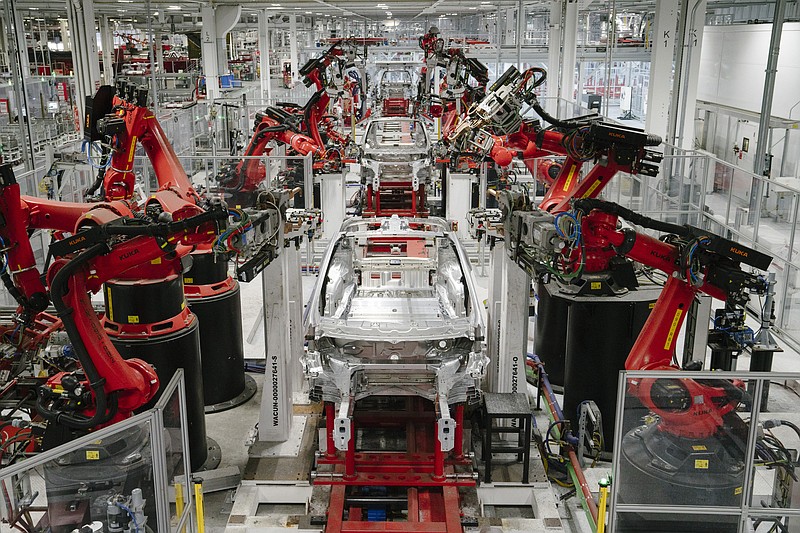As the Biden administration promises to jump-start the clean-energy economy, it faces an uphill climb: The United States has fallen behind Asia and Europe in the race to produce the central technology -- the high-tech batteries that power electric cars and store solar and wind energy.
China dominates battery production today, with 93 "gigafactories" that manufacture lithium-ion battery cells, versus only four in the United States, according to Benchmark Mineral Intelligence, a prominent data provider. If current trends continue, China is projected to have 140 factories by 2030, while Europe will have 17 and the United States just 10.
That would leave the United States dependent on China and other trading partners for much of its battery supply, a risky proposition not just for the auto industry but for the military, which is planning to electrify more of its vehicles and gear. It would also mean missing out on much of the jobs boom the sector is expected to bring.
"This could be a game-changer when it comes to jobs, but we have to find a way to ensure we keep the technology in the U.S. and incentivize companies to produce it in the U.S.," said Venkat Srinivasan, a top battery expert at Argonne National Laboratory in Lemont, Ill.
That will happen, say U.S. companies and clean-energy supporters, only if the federal government helps coordinate and finance an aggressive push to boost domestic manufacturing of batteries and their raw materials, as governments in China, Korea and Europe are doing.
"We're naive to pretend this will happen without government dynamism and action," said Danny Kennedy, chief executive officer of New Energy Nexus, a nonprofit in Oakland, Calif., that funds and advises start-ups.
The calls are part of a renewed embrace of industrial policy to help the United States keep its technological edge in an increasingly competitive global economy. Backers of federal action say that without it, the United States risks losing out on another major technology boom -- as it did with solar panels and 5G mobile network equipment.
Thanks to its federally funded universities and national labs, the United States has some of the best early-stage battery research in the world. It also has Tesla, an electric-car leader with big plans for domestic battery production. But other countries are doing far more to support their battery industries and ensure that production jobs stay local.
China is bolstering its battery and electric-vehicle companies with tens of billions of dollars in state support, including research and development funding, subsidies for manufacturers and financing for battery-charging stations.
The European Union is also closely involved in supporting its battery sector, having established a European Battery Alliance in 2017 that set sweeping goals for manufacturing, charging infrastructure and electric-car adoption.
U.S. INCENTIVES DRIED UP
Under the Obama administration, the United States offered federal loan guarantees to support clean-energy companies including Tesla, which is now one of the world's most valuable auto companies. It also introduced a $7,500 tax credit for electric-car purchases, but the perk was limited to 200,000 cars per manufacturer, which Tesla and GM have already exhausted.
Some of this federal support dried up during the Trump administration under withering criticism from conservatives, who dismissed clean energy as a liberal priority.
President Joe Biden has said he will "use all the levers of the federal government, from purchasing power, R&D [research and development], tax, trade, and investment policies" to "position America to be the global leader in the manufacture of electric vehicles and their input materials."
He took a first step by signing an executive order calling on government agencies, including the U.S. Postal Service, to start converting their fleets to electric vehicles. He's also pledged to build 500,000 charging stations, revise and extend tax credits for buyers and tighten fuel economy standards for gas-powered vehicles, which the Trump administration relaxed.
MANUFACTURING GAP
Doug Campbell, co-founder of battery start-up Solid Power in Louisville, Colo., said the United States should increase tax breaks and other financial support for companies building manufacturing plants.
"One thing we do great here is innovate," said Campbell, whose company was spun out of the University of Colorado. "But where there is a chasm is when it gets to manufacturing scale. That is where other nations step in and provide some of that capital before a bank is willing to lean in."
He added, "We can choose to step in and entice industry and growth, or we cannot and run the risk that we are ceding all of this overseas."
Lithium-ion batteries grew out of research that won the 2019 Nobel Prize in chemistry. The powerful, rechargeable batteries first appeared in Sony camcorders in the early 1990s and are now used in everything from smartphones and laptops to electric vehicles.
They are also crucial for harnessing renewable energy, allowing power companies to store solar and wind energy for use when the sun goes down and the wind stops blowing. Cars, buses and power companies use large battery packs containing thousands of individual battery cells.
